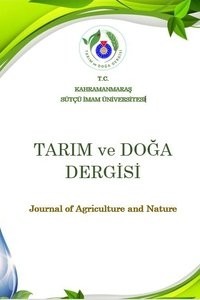Effect of Cooking Methods on Dietary Fibre Components of Fresh Vegetables, Legume and Cereal Samples
Neutral detergent fibre (NDF), acid detergent fibre (ADF) and hemicellulose contents of 8 freshvegetables and 6 legumes and cereals were studied by microwave, pressure and conventional cooking methods. Theraw vegetables contained 10.8-34.2% NDF, 9.2-28.2% ADF and 1.2-6% hemicellulose, respectively. NDF contentsof vegetables for conventional, pressure and microwave cooking were ranged 8.8-29.6, 8.1-26.5, 9.1-28%. ADF andhemicellulose contents of vegetables for conventional, pressure and microwave cooking were ranged 8.6-25, 8.1-23,8.9-23.7% and 0.9-4.6, 0.6-3.5, 0.6-4.3%, respectively. NDF, ADF and hemicellulose contents for raw legumes andcereals were ranged between 9.2-30.1%, 7.3-21.5 %, and 1.9-20.6%, respectively. The values for conventional,pressure and microwave cooking of NDF, ADF and hemicellulose contents for legumes and cereals were rangedbetween 7.4-23.1%, 6.1-21.6%, 7.1-23.3%, 6.1-20%, 5.2-20%, 5.9-20.5%, and 1.3-16.2%, 0.9-14%, 1.2-16.2%,respectively. Pressure-cooking showed a more pronounced effect on the reduction of these dietary fibre componentsthan conventional and microwave cooking.Keywords: ADF, NDF, hemicellulose, fresh vegetable, legume, cereal.
Anahtar Kelimeler:
ADF, NDF, hemicellulose, fresh vegetable, legume, cereal
___
- Anderson, J.W., Smith, B.M., Washnock, C.S. 1999. Cardiovascular and renal benefits of dry bean and soybean intake. American Journal of Clinical Nutrition, 70: 464-474.
- Asp, N.G., Johansson, C.G., Hallmer, H., Siljeström, M. 1983. Rapid enzymatic assay of insoluble and soluble dietary fibre. Journal of Agricultural Food Chemistry, 31: 476-482.
- Berry, C.S. 1986. Resistant starch: Formation and measurement of starch that survives exhaustive digestion with amylolytic enzymes during determination of dietary fibre. Journal of Cereal Science, 4: 301-314.
- Bosaeus, I. 2004. Fibre effects on intestinal functions (diarrhea, constipation and irritable bowel syndrome). Clinical Nutrition Supplements, 1: 33-38.
- Chandalia, M., Garg, A., Lutjohann, D., Von Bergmann, K., Grundy, S.M., Brinkley, L.J. 2000. Beneficial effects of high dietary fiber intake in patients with type 2 diabetes mellitus. The New England Journal of Medicine, 342: 1392-1398.
- Jenkins, D.J.A., Kendall, C.W.C., Augustin, L.S.A., Franceschi, S., Hamidi, M., Marchie, A., et al. 2003. Glycemic index: overview of implications in health and disease. American Journal of Clinical Nutrition, 76: 266-273.
- Kushi, L.H., Meyer, K.M., Jacobs, D.R. 1999. Cereals, legumes, and chronic disease risk reduction: evidence from epidemiologic studies. American Journal of Clinical Nutrition, 70: 451-458.
- Mcqueen, R.A., Nicholson, J.W.G. 1979. Modification of the neutral detergent fibre procedure for cereal and vegetables by using alpha amylase. AOAC, 62: 676-681.
- Mongeau, R., Brassard, R. 1995. Importance of cooking temperature and pancreatic amylase in determination of dietary fibre in dried legumes. AOAC, 78: 1444-1449.
- Prosky, L., Devries, J.W. 1991. Controlling dietary fiber in food products. Van Nostrand Reinhold, New York, USA.
- Prosky, L., Asp, N.G., Schweizer, T.F., Devries, J.W., Furda, I. 1988. Determination of insoluble, soluble, and total dietary fibre in foods and food products: inter laboratory study. AOAC, 71: 1017-1023.
- Rege, D.V. 1981. Nutritional aspects of legumes: Some research needs. In Proceedings of the Workshop on Grain Legumes (Ed. Aiyer A.S., Iyer, K.R.), Protein Foods and Nutrition Development, 123- 132.
- Rehinan, Z., Rashid, M., Shah, W.H. 2004. Insoluble dietary fibre components of food legumes as affected by soaking and cooking processes. Food Chemistry, 85: 245-249.
- Rehman, Z., Islam, M., Shah, W.H. 2003. Effect of microwave and conventional cooking on insoluble dietary fibre components of vegetables. Food Chemistry, 80: 237-240.
- Robertfroid, M. 1993. Dietary fibre, inulin and oligofructose: a review comparing their physiological effect. Critical Reviews in Food Science and Nutrition, 33:103-148.
- Yayın Aralığı: 6
- Başlangıç: 1997
- Yayıncı: Kahramanmaraş Sütçü İmam Üniv.
